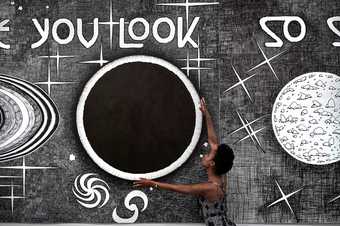In the 1980s, Russia became infatuated with a space-centred utopian concept called Cosmism. Cosmism saw the vision and the political project of the communist revolution intertwine.
Taking place during the opening of Tate Modern’s landmark retrospective Ilya and Emilia Kabakov: Not Everyone Will Be Taken into the Future, this conversation considers the influence of Cosmism within their practice. Speakers will take a closer look at seminal works such as The Man Who Flew into Space from his Apartment, which presents space as a realm of total freedom: a place where a person could escape from the hopelessness of late-Soviet society.
With artist Aleksandra Mir, philosopher, activist and curator Maria Chehonadskih, and Dimitri Ozerkov, Director of “The Hermitage 20/21” Project for Contemporary Art at The State Hermitage Museum, St Petersburg.
Biographies
Aleksandra Mir was born in Poland, raised in Sweden and educated in the USA. She lived for five years in Sicily and has been based in London since 2011. Her multicultural background informs an anthropological inquiry. As an artist she deeply researches her culture before adding anything new to it. Her art is populated by real people and real events, where she inserts herself as a foreign element which naturally belongs there. Her seminal work ‘First Woman on the Moon’, which was produced on a zero budget, with the help of 50 volunteers, 2 municipalities and 10 bulldozers, took place on a beach in the Netherlands in 1999. The video has been touring art institutions for 17 years, it is included in the Guggenheim Museum and Tate collections, and when put on display at Tate Modern in 2013/14 it was viewed by 4 million people. The work has been acknowledged in Mir’s correspondence with Neil Armstrong and Sir Arthur C. Clarke. It was most recently subject for discussion between Mir and Jan Woerner, General Director of the European Space Agency, who is planning the creation of a moon village: a concept involving multiple actors that aims at democratising space, and as such helps realise Mir’s vision.
Dimitri Ozerkov is a Russian art historian and curator specializing in 18th century and contemporary art. A graduate of the Art History Department of St Petersburg State University, he became curator of 15th- to 18th-century French engravings at the State Hermitage Museum in 1999 and researched the history of the Imperial Print Room. In 2003 he received his PhD in St Petersburg State University. Since 2007 he has held the posts of Head of the Contemporary Art Department of the State Hermitage Museum, St Petersburg, and Head of the Hermitage 20/21 Project for Contemporary art, which involves collecting and displaying modern art in a traditional museum. Under the auspices of the Hermitage 20/21 Project he curated or organized over 30 exhibitions, featuring art by Chuck Close, Wim Delvoye, Antony Gormley, Ilya Kabakov, Jan Fabre, Anselm Kiefer, Marcus Lupertz and other Russian and international artists. In 2011 and 2015 he led the State Hermitage projects for the Venice Biennale, exhibiting Dmitry Prigov and Glasstress 2015 Gotika.
Maria Chehonadskih is a philosopher and critic. She received her PhD in philosophy from the Centre for Research in Modern European Philosophy, Kingston University, London in 2017. Chehonadskih works on the problem of Soviet epistemologies across Marxist philosophy, literature and art. Her texts on Soviet philosophy, art theory and post-Soviet politics were published in journals such as Radical Philosophy, South Atlantic Quarterly, Moscow Art Magazine and Alfabeta2. Chehonadskih occasionally curates and works in collaboration with artists. Her last exhibition ‘Shadow of a Doubt’ (curated together with Ilya Budraitskis) was dedicated to the problem of conspiracy (Garage Museum of Contemporary Art, Moscow, 2014). Lives and works in London and Moscow.
Tickets to this event include discounted entry to Ilya and Emilia Kabakov: Not Everyone Will Be Taken Into The Future.
This event has been provided by Tate Gallery on behalf of Tate Enterprises LTD.

